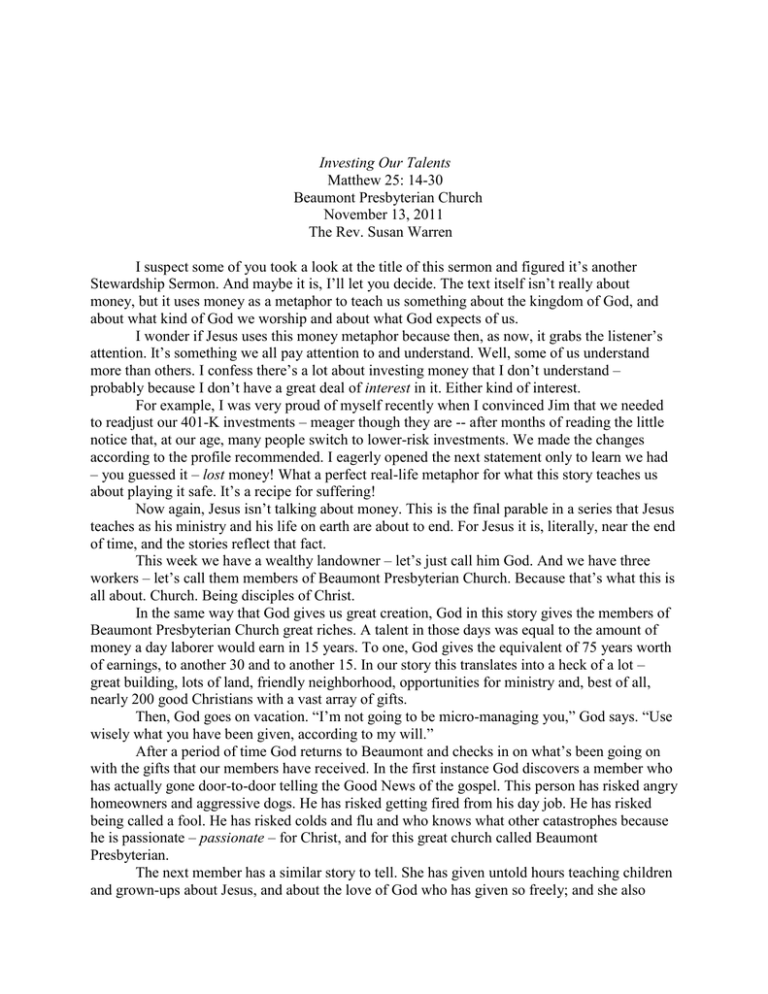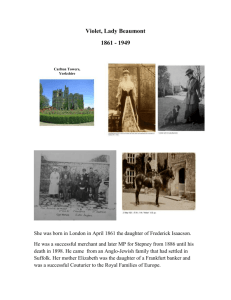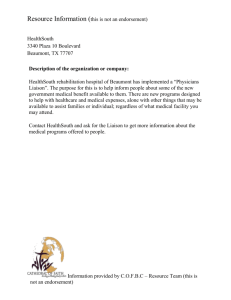November 13, 2011 "Investing Our Talents"
advertisement

Investing Our Talents Matthew 25: 14-30 Beaumont Presbyterian Church November 13, 2011 The Rev. Susan Warren I suspect some of you took a look at the title of this sermon and figured it’s another Stewardship Sermon. And maybe it is, I’ll let you decide. The text itself isn’t really about money, but it uses money as a metaphor to teach us something about the kingdom of God, and about what kind of God we worship and about what God expects of us. I wonder if Jesus uses this money metaphor because then, as now, it grabs the listener’s attention. It’s something we all pay attention to and understand. Well, some of us understand more than others. I confess there’s a lot about investing money that I don’t understand – probably because I don’t have a great deal of interest in it. Either kind of interest. For example, I was very proud of myself recently when I convinced Jim that we needed to readjust our 401-K investments – meager though they are -- after months of reading the little notice that, at our age, many people switch to lower-risk investments. We made the changes according to the profile recommended. I eagerly opened the next statement only to learn we had – you guessed it – lost money! What a perfect real-life metaphor for what this story teaches us about playing it safe. It’s a recipe for suffering! Now again, Jesus isn’t talking about money. This is the final parable in a series that Jesus teaches as his ministry and his life on earth are about to end. For Jesus it is, literally, near the end of time, and the stories reflect that fact. This week we have a wealthy landowner – let’s just call him God. And we have three workers – let’s call them members of Beaumont Presbyterian Church. Because that’s what this is all about. Church. Being disciples of Christ. In the same way that God gives us great creation, God in this story gives the members of Beaumont Presbyterian Church great riches. A talent in those days was equal to the amount of money a day laborer would earn in 15 years. To one, God gives the equivalent of 75 years worth of earnings, to another 30 and to another 15. In our story this translates into a heck of a lot – great building, lots of land, friendly neighborhood, opportunities for ministry and, best of all, nearly 200 good Christians with a vast array of gifts. Then, God goes on vacation. “I’m not going to be micro-managing you,” God says. “Use wisely what you have been given, according to my will.” After a period of time God returns to Beaumont and checks in on what’s been going on with the gifts that our members have received. In the first instance God discovers a member who has actually gone door-to-door telling the Good News of the gospel. This person has risked angry homeowners and aggressive dogs. He has risked getting fired from his day job. He has risked being called a fool. He has risked colds and flu and who knows what other catastrophes because he is passionate – passionate – for Christ, and for this great church called Beaumont Presbyterian. The next member has a similar story to tell. She has given untold hours teaching children and grown-ups about Jesus, and about the love of God who has given so freely; and she also organizes mission work, hosts meals and other fellowship activities, sings in the choir, plays bells, greets people when they arrive, makes coffee, knits and crochets, changes diapers in the nursery, calls members who are sick – whew! She and others like her risk the investment of time and probably sanity because of their love. God looks around at the happy, smiling faces at Beaumont Presbyterian Church, working together, welcoming new members, sharing the many tasks required of a thriving congregation and says “Well done, good and faithful people! You have invested wisely what I’ve given you and because of the risks you’ve been willing to take you continue to thrive. You will not tire and grow weary for you carry each other’s burdens and share in this high-risk venture called church. And all is well and the people of Beaumont Presbyterian Church are even more greatly blessed. But wait. There is another scenario led by that third member, who responds to God in a different way. “I have,” says he, “attended church almost every Sunday since you’ve been gone on your journey.” “And?” says God. “And, um, I have attended Sunday School a couple of times.” “And?” “Okay, you, God, can be a little scary, and I just wasn’t sure exactly what I should do, and I didn’t want to risk spending a lot of my time – which I don’t have much of by the way because I’m a very BUSY person – I didn’t want to risk too much at Beaumont because it seems to me that attendance has been a little down, and I hear money is tight, and I hear volunteers are spread pretty thin and they’re tired and I just don’t know where this is headed, so I didn’t think it would be a particularly prudent investment of my time and talents to spend them on such an iffy proposition. Besides that, I can’t really do anything very well; I can’t sing and I don’t like to teach and I’m too old to garden and the mission people meet on the wrong night. I thought you would want me to play it safe, so I just come to hear the preaching and the singing.” A recipe for failure. In Matthew’s words, a recipe for darkness and weeping and gnashing of teeth. Which scenario do you choose for Beaumont? It is my observation that churches most of the time are “on the brink.” Sure, they have times when they sail, and times when they tank, but most of the time they’re somewhere in-between, poised to make some risky new investments or poised to play it safe. Cause for great debate in many churches. Which way will we go? How much should we risk? Friends, what are you willing to invest to generate a healthy church? What are you willing to do – because it’s not going to happen without you. Presbyterian pastor and author John Buchanan notes that Jesus could have told the story of the talents a different way. What if the two had made high-risk investments and lost all of their master’s money? The third one would have looked pretty smart. But Jesus didn’t tell it that way. He told it so it turns out that the greatest risk of all is to not risk anything, to be slothful. “Sloth means not caring, not loving, not rejoicing, not living up to the full potential of our humanity, playing it safe, investing nothing, being cautious and prudent, digging a hole and burying the money in the ground.” (Feasting on the Word, Year A, Volume 4, Page 310.) We have good, strong ministries here at Beaumont. They need the help of all of us to remain viable and flourish. I can’t think of a better investment. Amen.





![Domesday Book [1]](http://s3.studylib.net/store/data/009049341_1-802a3ae6e33977f3517a81a9b1bd68c9-300x300.png)
